Nobody could possibly object if you found a way to bypass the middleman in a financial transaction and save money on fees – except possibly the middleman.
When he spoke to the Pattaya City Expats Club at their Sunday, December 28 meeting, Aaron Siwoku described “bitcoin” as a “new and innovative form of digital cash” – also known as a “cryptocurrency” – that allows people to send and receive money with no middleman – i.e. no bank or other commercial entity involved. Aaron’s opinion was that bitcoins will fundamentally change the way we deal with money. Aaron Siwoku is the 31-year-old founder of Cryptosigma. com. He has been creating mobile and digital payment platforms for the last 10 years.
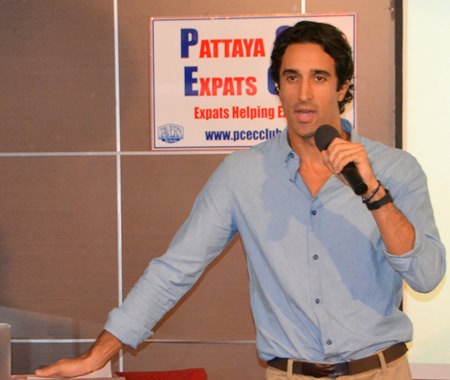 Aaron Siwoku describes to his PCEC audience how “bitcoin” is a “new and innovative form of digital cash” – also known as a “cryptocurrency.” Further explaining that it allows people to send and receive money with no middleman.
Aaron Siwoku describes to his PCEC audience how “bitcoin” is a “new and innovative form of digital cash” – also known as a “cryptocurrency.” Further explaining that it allows people to send and receive money with no middleman.
Currently, if you want to send money to someone in another country, you can wire it through a bank or through a service such as Western Union or PayPal. You may even be able to do it online. But there are always fees involved, ranging from 3% to 10% depending on the size of the transaction. And if the money has to be changed into another currency, there are even fees built into the exchange rates.
Aaron mentioned that when using bitcoin the fees are minimal, perhaps 0.5%, sometimes even lower. There are several online exchanges where you can deposit your money and purchase bitcoins, and then send bitcoins to someone else – as long as that person also has an account with a bitcoin exchange. Aaron said it is as easy as sending an email.
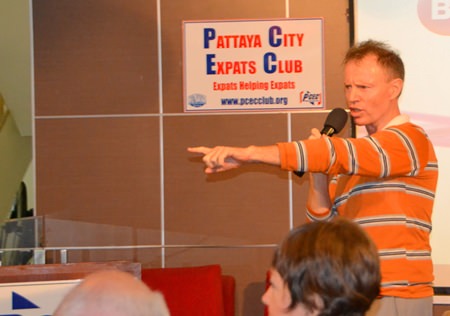 Club member Ren Lexander calls on a member of the PCEC audience with a question or comment about expat living in Pattaya during the Open Forum part of the Sunday meeting.
Club member Ren Lexander calls on a member of the PCEC audience with a question or comment about expat living in Pattaya during the Open Forum part of the Sunday meeting.
A bitcoin is like a currency except that it is not issued or controlled by a country. You can’t hold a bitcoin in your hand. You can’t go to an ATM and take out bitcoins. And you certainly can’t stuff bitcoins in your mattress. Bitcoins are a virtual currency.
There are several on-line exchanges where you can purchase and store bitcoins. Aaron has a company that runs one of the exchanges: Cryptosigma.com.
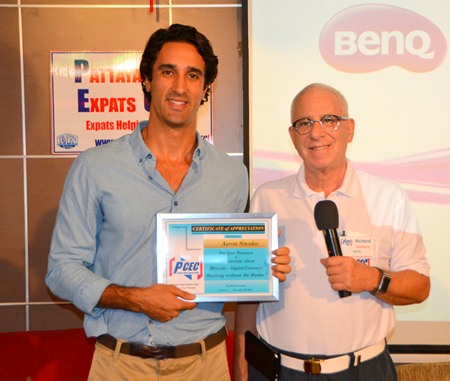 MC Richard Silverberg presents Aaron Siwoku with the PCEC’s Certificate of Appreciation for his informative talk about bitcoins and how cryptocurrency will change the future of banking.
MC Richard Silverberg presents Aaron Siwoku with the PCEC’s Certificate of Appreciation for his informative talk about bitcoins and how cryptocurrency will change the future of banking.
Aaron said that there are six billion people in the world who are “under-banked,” meaning they have no way to send or receive money. Once bitcoins become more firmly established, he explained, a person in Africa who can afford to pay $5 for a smart phone will be able to act as a “bitcoin banker” for 999 other people that don’t have smart phones.
Bitcoins are an innovation, Aaron said. Like all innovations, they are often greeted with scepticism. The reason that there is considerable price volatility in bitcoins at present is that the market is still very illiquid. He said that his exchange offers an “auto-exchange” system to minimise volatility.
Aaron commented that the only innovation introduced by banks in the last 20 years is the ATM machines.
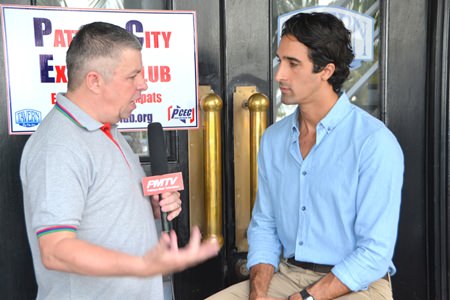 Paul Strachan with PMTV interviews Aaron Siwoku about his talk to the PCEC about bitcoins which can be seen on You Tube: https://www.youtube. com/watch?v=AC_3jMAiyDg for the interview.
Paul Strachan with PMTV interviews Aaron Siwoku about his talk to the PCEC about bitcoins which can be seen on You Tube: https://www.youtube. com/watch?v=AC_3jMAiyDg for the interview.
In response to a question about how bitcoins could work in practice, Aaron explained that a person in Thailand could deposit $5,000 in a bitcoin account; convert the US dollars into bitcoins; and transfer the bitcoins by email to his cousin in, say, Fiji (providing the cousin has a bitcoin account) – and the cousin could then spend the bitcoins or transfer them to someone else or convert them to his local currency, all for a fee of about 0.1%.
Some online merchants are accepting payment for goods with bitcoins, Aaron said. According to one U.S.-based website, www.consumerist .com, bitcoins can be used to purchase “swanky cocktails in Manhattan, a Tesla car, tickets and concessions for the Sacramento Kings, and anything you want from Overstock.com.” Further, the list of merchants who accept bitcoins is expected to grow in future.
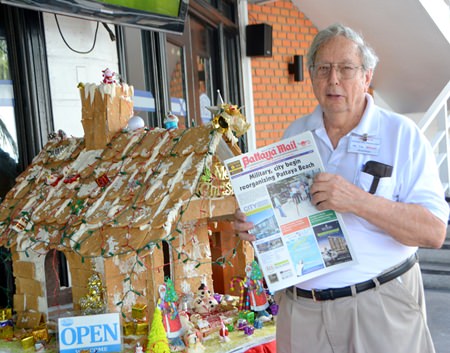 PCEC Board Member Wilson Fletcher greets members and guests at the PCEC Sunday meeting when they arrive and ensures they know that a free copy of Pattaya Mail will be available for them at the end of the meeting.
PCEC Board Member Wilson Fletcher greets members and guests at the PCEC Sunday meeting when they arrive and ensures they know that a free copy of Pattaya Mail will be available for them at the end of the meeting.
That same website says: “For the first three to four years of its life, bitcoin was actually fairly stable, as historical charts show. The price increased very gradually from roughly $0.05 per bitcoin to more like $5 per bitcoin, which is indeed a good rate of return for early investors. And that concept of ‘investors’ is key. Bitcoin is a market full of speculators, and because it’s not tied to anyone’s monetary policy or oversight, it’s prone to boom and bust. Since the beginning of 2013, the value of bitcoin has jumped as high as $1116 and dropped to $539.”
Aaron added that his company makes available a Visa debit card that allows you to pay merchants with bitcoins. Bitcoins are not the only cryptocurrency available today. Others include “litecoin,” “dogecoin” and “peercoin.”
At the conclusion of his presentation, the PCEC thanked Aaron for providing information about a topic many did not fully understand. In addition, as with any speaker whose topic relates to the investment or use of money, it was noted for the audience that the speaker’s views were his own and was not an endorsement by the PCEC. Further, advising any interested members and guests to do their own research and to as always exercise due diligence before investing money.
MC Richard Silverberg brought everyone up to date on upcoming events and called on Ren Lexander to conduct the Open Forum, where questions are asked and answered about Expat living in Thailand, especially Pattaya.
For more information on the PCEC’s many activities, visit their website at www.pcecclub.org.




